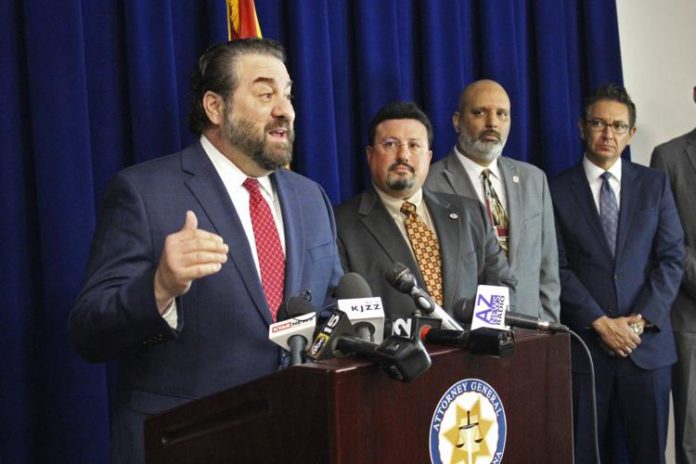
Arizona Attorney General Mark Brnovich announced that he joined a coalition of 16 states in filing an amicus brief urging the United States District Court for the Northern District of Georgia to uphold the state’s recently-enacted “Election Integrity Act of 2021.”
The attorneys general expressed their support for Georgia’s motion to throw out the U.S. Department of Justice (DOJ) lawsuit against the new voting law, which Georgia said was based on “political posturing rather than a serious legal challenge.”
The “Election Integrity Act of 2021,” or Senate Bill 202, passed the legislature along party lines. Gov. Brian Kemp, R-Ga, signed the 98-page omnibus bill on March 25.
“President Biden, the left, and the national media are determined to destroy the sanctity and security of the ballot box,” Kemp said in a statement after signing the bill.
SB 202 requires voter identification of either a driver’s license number, state ID number, or a copy of an acceptable voter ID for absentee ballots, shortens the time frame to request and complete an absentee ballot, and allows fewer ballot drop boxes in metro Atlanta than were available during last year’s election. It also expands early in-person voting, prohibits handing out food and water to voters in line, lets the Legislature seek the replacement of county election boards, and allows local officials to begin processing absentee ballots starting two weeks before the election.
In their lawsuit, the DOJ argued that SB 202 violated the Voting Rights Act, which bars the enactment of any voting practice or procedure, resulting in the “denial or abridgment” of the right to vote based on race or color.
The lawsuit states that “Georgia enacted S.B. 202 with knowledge of the disproportionate effect that numerous provisions, both singly and together, would have on Black voters’ ability to participate in the political process on an equal basis with white voters.”
In his motion to dismiss the lawsuit, Georgia Attorney General Chris Carr cited the Court’s ruling in Brnovich v. DNC. The Supreme Court upheld Arizona voting regulations on ballot-harvesting and out-of-precinct voting. The Court decided that the “usual burdens of voting” and “mere inconvenience” do not violate laws barring discrimination and that states can set the time, place, and manner of their elections.
Democrats argued that the new voting laws threaten American democracy, including President Joe Biden, who referred to the new voting laws as “Jim Crow on steroids.”
Brnovich demonstrated his argument on behalf of election integrity laws by citing the bipartisan Commission on Federal Election Reform chaired by former President Jimmy Carter and Secretary of State James Baker, which found that “[a]bsentee ballots remain the largest source of potential voter fraud.” He called the DOJ’s lawsuit against Georgia a “meritless attack.”
“Election integrity should not be a partisan issue,” he said in a press release. “The U.S. Supreme Court made it abundantly clear in Brnovich v. DNC that states have the ability to administer elections and pass laws to protect the integrity of the results.”
Elizabeth Troutman | The Center Square contributor













